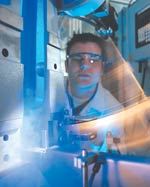Materials (K 2001 Preview)
New materials at K 2001 are weighted heavily toward the engineering variety, especially nylons, acetals, and TP polyesters. A large handful of polypropylenes round out the major news.
Lots new in polyolefins
Basell Polyolefins (U.S. office in Wilmington, Del.) will feature its latest Adflex and Adsyl film grades made with the Catalloy PP-copolymer process. To begin with, two new Adflex grades offer improved flexibility and softness. The newest developmental grade has a flex modulus of 2900 psi and hardness of 75 Shore A, compared with 90 Shore A for existing grades. Made without plasticizers, it will be positioned as a replacement for PVC in applications such as medical I.V. bags and pouches and soft hygiene film.
Already commercial Adflex W has a slightly higher modulus and is aimed at cling-film packaging made by either blown or cast processes.
Four improved Adsyl film sealant grades can be used in most PP films—cast, oriented, blown, and shrink. Processability of Adsyl 3HP and 5HP has been expanded by increasing the “Delta temperature,” which is the difference between the melting point and seal-initiation temperature. Another enhancement is that they can be metalized using typical methods. Grade 3HP is commercial and 5HP will be available in the fourth quarter.
Lower seal-initiation temperatures are being achieved with new Adsyl 6 (199 F) and Adsyl 7 (176 F). Existing Adsyl 5 products have a 347 F seal-initiation temperature.
Clyrell PP resins, a new family from Basell, are said to provide a unique combination of gloss, clarity, low-temperature toughness, and microwaveability. They are said to show great promise for see-through ice-cream containers and freezer-to-microwave food packaging.
Basell will also feature its Metocene metallocene polypropylenes, which were previously available only in Europe but are now being introduced to the U.S. market. Injection molding grades provide increased toughness, low warpage, and good contact clarity to CD and DVD cases. Extrusion grades improve the strength and softness of nonwoven products such as diapers, air filters, and medical masks by producing finer and stronger fibers.
Basell’s new Lupolen 3321C MDPE film resin reportedly runs easily in high- or low-stalk processing with low gel levels. It is said to be well balanced in stiffness and toughness, tear strength, and puncture resistance, and thereby offers downgauging potential.
Clear styrenic copolymer
BASF Corp. (U.S. office in Mt. Olive, N.J.) is introducing the third generation of Styrolux styrene-butadiene copolymers. The first of the new line, grade 3G 55, is claimed to give blends with crystal PS higher transparency, gloss, and impact strength at lower loadings and lower overall cost.
New nylons galore
DuPont Engineering Polymers of Wilmington, Del., and Geneva, Switzerland, has high expectations for its new Caltrel fluid-energy-transfer systems for heating and cooling of buildings, cars, and appliances. Caltrel systems eliminate metal tubes and fins. Instead, they use lightweight nylon tubing to convey heat-transfer fluids and to dissipate heat. The key to the technology is to keep the tubing wall less than 0.4 mm thick in order to permit effective convection at the air/solid interface. Caltrel is a “system technology” that includes materials and know-how for product design and manufacturing. One element is a special nylon 66 tailored for high melt strength. Caltrel licensees also obtain proprietary know-how for automated assembly using various welding techniques. The first commercial uses of Caltrel will surface next year in auto-engine intercoolers and in commercial refrigeration and HVAC applications. Solar heating is one of many applications under study.
In anticipation of a shift to 42-volt electrical systems in cars, DuPont developed its first translucent grade of Zytel nylon 66 that is used in a 42V fuse casing. It costs 20% less than previously used polysulfone and polyethersulfone.
For high-performance gears in automotive power-steering systems, DuPont launched the Zytel WRF family of wear-resistant, low-friction nylon 66 compounds containing glass fiber and Teflon microbeads. Rubber-modified super-tough grades are also offered. Later this year, DuPont will come out with additional grades offering higher heat and chemical resistance and greater dimensional stability than nylon 66 can provide.
DuPont also has new grades of Zytel HTN semi-aromatic PPA nylons. The 53 and 54 series are for structural applications requiring high stiffness and impact strength with low moisture absorption. These resins can be processed in water-heated tools.
The company also developed a special grade of Zytel HTN that can withstand up to 160 C (320 F) in a welded resonator for a turbo-charged car engine.
DuPont also extended its Super Tough Zytel ST801 series with the new “Advantage” line, said to offer “radically improved” flow without any sacrifice in product performance. Benefits include ability to mold faster with reduced molding pressures, thinner walls, and longer flow distances.
For molded EMI shielding, DuPont’s new Zytel EMX 505 is a new compound of nylon and carbon fibers. It provides EMI attenuation of up to 80 db.
Rhodia Engineering Plastics in Mississauga, Ont., will launch new Technyl nylon 6 grades tailored for automotive cooling systems. Grades A218 G1 V0 and A218 G2 V30 offer resistance to glycols and elevated temperatures. Both are offered unfilled or with 25% and 30% glass.
Rhodia is also introducing impact-modified TechnylStar S246 V35 for power-tool parts. TechnylStar nylons are a novel class of resins that exhibit a semi-crystalline, star-like structure offering outstanding processing and appearance properties, the company claims. Commercial uses now include automotive engine covers, air-intake manifolds and trim parts, fishing reels, and appliance doors.
Acetal & TP polyesters
In acetal, DuPont’s new Delrin 311DP series combines flow and toughness to permit molding thinner, more complex parts without sacrificing mechanical properties. DuPont says no competitive acetal of comparable flowability has better fatigue resistance than 311DP. The new grade also reportedly cycles as fast as any acetal on the market.
Advanced lubrication technology in new Delrin 500AL and 100AL eliminates the famous “squeak” of acetal slipping on itself. The new grades make for quieter gears, rollers, and casters for office equipment, furniture, and conveyors.
DuPont has also commercialized Delrin 500LM BKL002, a laser-transparent black grade that makes possible laser welding of black automotive parts. This technical breakthrough will be extended to DuPont’s Zytel nylons, too.
Another new grade of Delrin is designed to overcome the inherent non-stick property of acetal so that it will adhere to styrenic-based TPE in injection overmolding applications.
In polyesters, DuPont developed Rynite FR531 PET to meet very stringent heat and electrical requirements. It is used in the induction hob for a cooking oven and must withstand temperatures up to 200 C (392 F) for sustained periods. It also has high CTI performance.
DuPont also has new Rynite PET and Crastin PBT grades that provide improved colorability, good surface finish, and heat resistance in auto headlamp bezels.
And a new series of Crastin HR (Hydrolysis Resistant) PBTs shows improved performance in hot, humid environments. These grades reportedly pass demanding auto-industry requirements of USACAR Class III and retain up to 70% of their properties in the so-called Pressure Cooker Test.
New from BASF is a family of flame-retardant Ultradur PBTs. They have a UL 94V-0 rating at 0.75 mm thickness and pass the IEC glow-wire test without using brominated additives.
Eastman Chemical Co., Kingsport, Tenn., will introduce its newest family of specialty copolyesters designed for calendering, historically the exclusive realm of PVC. Available in different grades, Tsunami PETG boasts ease of processing, high melt strength, clarity, and gloss. It can be used on existing calendering lines with little or no modification, Eastman says, and the resin requires no drying prior to processing. It is said to have good thermal stability and does not form corrosive degradation products. It is also reportedly easy to emboss, print, laminate, and thermoform.
Eastman will also feature new coextruded sheet applications that provide static-dissipative properties at reduced cost using its antistatic grades of Eastar 6763 PETG. The three EastaStat PETG grades include GSP12, an alloy with a proprietary copolymer that provides permanent static dissipation (volume resistivity of 1010 to 1011 ohm-cm, depending on humidity) plus extremely low outgassing and extractables. It is used for packaging disk-drive components. GPS21 is a high-clarity, cost-effective PETG for one-way packaging of computer and electronic parts, with surface resistivity of 109 to 1010 ohm/sq, depending on humidity. GSP32 is a conductive, toughened compound containing carbon black (104 ohm/sq at all humidity levels).
More engineering resins
Bayer AG (U.S. office in Pittsburgh) claims the property balance of its new Makralon DPI-1848 polycarbonate is unequalled in the market today. This copolymer uses both standard bisphenol-A and a special second bisphenol to provide outstanding notched impact strength at -60 C (-76 F) while the HDT is elevated to 156 C (313 F), around 10° C (18° F) above that of conventional PC. The grade retains typical PC clarity. Potential uses are ski-boot buckles, snowmobile parts, lighting and lamp covers, and heater parts. The material withstands steam sterilization, opening potential in medical applications.
To meet stringent environmental and eco-label requirements, Bayer has developed Bayblend FR 3000, a family of flame-retardant PC/ABS alloys for injection molding and extrusion. They contain no chlorine or bromine but deliver a UL 94V-0 rating at a wall thickness of just 0.8 mm. Products are hydrolysis resistant and cause little exudation or “juicing” during processing, thus preserving part surface quality. Extrusion uses include cable ducts for public buildings and interior trim for public transport vehicles.
DuPont recently launched a thermoplastic polyimide resin, Vespel TP 8556. Its high wear resistance has been confirmed in tests of seal rings for automatic transmissions. Up to now, the Vespel name was used only for thermoset polyimide composites, which DuPont sold as molded parts.
Victrex (U.S. office in Greenville, S.C.) will show off technology for copper plating PEEK electronic parts such as interconnect devices.
In liquid-crystal polymers, DuPont may reveal details on new blow moldable grades of LCP that it is developing for high-heat engineering applications.
TPEs & TPVs
Two thermoplastic vulcanizates, Santoprene X8621-60 and X8621-70 (60 and 70 Shore A, respectively), are to be introduced by Advanced Elastomer Systems (AES), Akron, Ohio. These non-hygroscopic, stain-resistant materials are aimed at extruded seals for building products. These TPVs’ easy colorability can add a new aesthetic dimension to weather seals for vinyl, metal, or wood window frames.
For soft-touch parts, AES is introducing Santoprene 8211-55B100, which adheres directly to substrates like ABS, PC, ABS/PC, PS, ASA, and PE. Previously, most styrenics have resisted high-integrity bonding to TPVs in overmolding applications.
A new CVJ boot grade of DuPont’s Hytrel polyester TPE has improved abrasion and chemical resistance. That allows the boots to be downsized, reducing material cost. Also, new Hytrel extrusion grades have enhanced uv and chemical resistance that allows them to replace copper and aluminum tubing in aggressive environments.
Kraiburg TPE GmbH of Germany will introduce a brand-new TPE at K. (Kraiburg has a sales office in Duluth, Ga., and plans to start U.S. manufacturing early next year.) Called “E2,” it is said to be a unique, patented compound based on epoxidized natural rubber in a PP matrix. Kraiburg has an exclusive license to make and sell E2, which boasts outstanding oil and heat resistance.
Plastics that conduct heat
Cool Polymers, Inc., Warwick, R.I., plans to unveil the first flexible versions of its thermally conductive compounds. These injection moldable TP elastomer grades come in a range of hardnesses. They offer low thermal resistance but are electrically insulating. They are aimed at medical, automotive, and telecommunications applications.
Meanwhile, Cool Polymers has also developed thermally conductive versions of liquid-crystal polymer (LCP). CoolPoly D2 and E2 both offer 20 W/mK thermal conductivity levels. E2 is electrically conductive, and D2 is electrically insulative. E2 also has much higher tensile modulus and tensile strength. Applications are heat pipes for small batteries and medical devices.
Related Content
Thermoplastic Elastomers With Recycled Content for Automotive Applications
Avient announced new grades of TPE to meet demand for recycled content.
Read MorePIR/PCR Recycled Content and Biobased TPEs for Broad Range of Applications
NPE2024: Kraiburg TPE launching PCR/PIR content polyolefin-based TPEs and its expanded line of Thermolast R biobased TPEs.
Read MoreCustom 3D Printed Parts Made From Bio-based Elastomers
Erpro's custom part printing service will now offer Arkema's Pebax RNew elastomer.
Read MoreEther-Based TPUs for Broad Range of Industry Applications
BASF’s Elastollan 1400 TPU series can be used for applications ranging from railway pads, hoses and profiles to show soles.
Read MoreRead Next
Making the Circular Economy a Reality
Driven by brand owner demands and new worldwide legislation, the entire supply chain is working toward the shift to circularity, with some evidence the circular economy has already begun.
Read MoreBeyond Prototypes: 8 Ways the Plastics Industry Is Using 3D Printing
Plastics processors are finding applications for 3D printing around the plant and across the supply chain. Here are 8 examples to look for at NPE2024.
Read More























